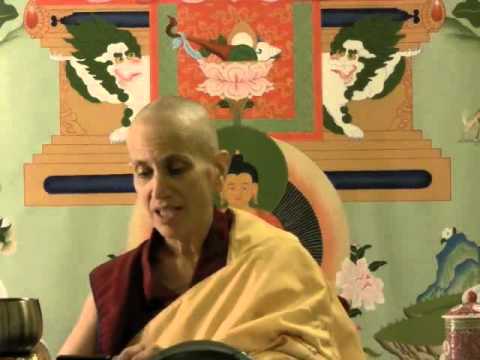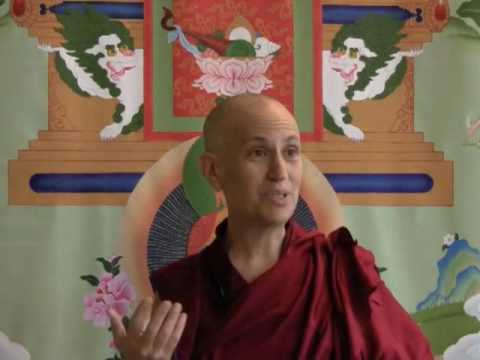Four opponent powers: Regret
Part of a series of Bodhisattva's Breakfast Corner talks on the Stages of the Path (or lamrim) as described in the Guru Puja text by Panchen Lama I Lobsang Chokyi Gyaltsen.
- Getting concerned about the negative karma we have created
- The four opponent powers
- The difference between regret and guilt
We got a question today from a viewer about the four opponent powers and how to purify karma, and that’s exactly what I was going to talk about today.
After we hear about the ten destructive pathways of action, and especially when we contemplate the results of karma, then we get really concerned because we can see in our lives that we’ve created a lot of negative karma, and even though we’re in the process of subduing those habits to create it again and again, still we have so many karmic seeds from the past on our mindstream that we need to take care of and clear away, otherwise they will ripen when conditions come together. The four opponent powers is the way to purify these karmic seeds and to modify how they’re going to ripen.
The four opponent powers are listed in different orders in different texts, but in all of the texts regret is the first one. Then the other three, the order may be different. I usually have it as the second one is restoring the relationship, which is my ad lib translation that’s usually called something like depending, or reliance, something like that, but restoring the relationship in your own heart gives more of a feeling for it. Then third is making a determination not to do it again, and fourth is a remedial action.
If you look at Vajrasattva practice, for example, you start out with restoring the relationship because you take refuge and bodhichitta first. Then you do the regret. Then you do the remedial action, and then you have the determination not to do it again. So you find it in different ways in different things. Don’t get confused. As long as all four are present it’s fine.
Let’s look at the meaning of them. The first one is regret, which is not guilt. You’ve heard me say this many times and we still feel guilty. According to Buddhism guilt is a totally useless emotion. Why? Because guilt is all about how bad I am, therefore how hopeless I am, therefore I’m never going to be forgiven. I can never make atonement for this. This is so awful and I think I’ll just get depressed. Whereas regret is simply I made a mistake and I regret having done it and I want to clear it up and get on with life.
Regret does not mean we brush it aside. It doesn’t mean being flippant, “Oh yeah, that doesn’t matter.” It is sincerely regretting it, but not feeling guilty about it. In the same way that if you touch a hot fire or kitchen coil on your stove, you regret it but you don’t feel guilty. If you drop a cup and it breaks, you regret it but you don’t feel guilty, hopefully, unless maybe you want to feel guilty. Your prerogative, it’s a free world. You can choose to make yourself miserable and feel guilty, no law against it. There should be. We don’t beat ourselves up with guilt. We just acknowledge that we made a mistake and then sincerely regret it because not only did we harm somebody else but also with our mistaken action we harm ourselves, and so we regret the fact that we’re going to experience some unpleasant result as a result of our negative behavior.
That’s regret. Regret must be there for any of the other three opponent powers to go on because if we don’t regret the action, then there’s no sense in restoring the relationship, making a determination not to do it again, or having some counteractive behavior. The first step is regret, which is really looking and acknowledging. It means getting over the rationalization, the excuses, the blaming, the justification, the suppression, repression. It means being honest with ourselves basically, and so it brings a certain feeling of relief. “Yes, I did it. Now I can make amends.” We’ll talk about the other three opponent powers next time.
Venerable Thubten Chodron
Venerable Chodron emphasizes the practical application of Buddha’s teachings in our daily lives and is especially skilled at explaining them in ways easily understood and practiced by Westerners. She is well known for her warm, humorous, and lucid teachings. She was ordained as a Buddhist nun in 1977 by Kyabje Ling Rinpoche in Dharamsala, India, and in 1986 she received bhikshuni (full) ordination in Taiwan. Read her full bio.


